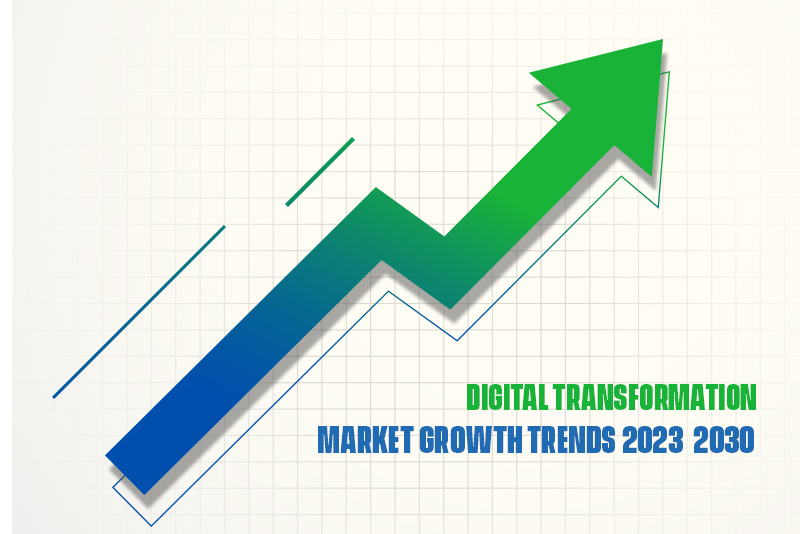Digital transformation is having a profound impact on businesses across almost all industries. It involves the integration of digital technologies into all aspects of an organization’s operations, fundamentally changing how businesses operate, deliver value to customers, and compete in the market. Business process outsourcing companies serve as strategic partners for businesses undergoing digital transformation, providing the expertise, technology, scalability, and flexibility needed to drive successful transformation initiatives.
According to a recent Grandview Research report, the global digital transformation market size was estimated at USD 731.13 billion in 2022 and is expected to reach USD 880.28 billion in 2023. The study expects the market to grow at a compound annual growth rate of 26.7% from 2023 to 2030 to reach USD 4,617.78 billion by 2030.
Digital experience platforms offer seamless integration with existing business processes, including Customer Relationship Management (CRM), contact centers, and social media platforms. By leveraging these capabilities, organizations can gain valuable insights that contribute to enhancing their return on investment. The ability to integrate with various systems allows for a comprehensive view of customer interactions, enabling businesses to deliver personalized experiences and optimize their operations. With the power of digital experience platforms, organizations can maximize the value of their investments and drive growth by leveraging actionable insights derived from integrated business processes. Here are some key ways in which digital transformation is impacting businesses:
Impact of Digitization on Businesses
- Improved operational efficiency: Digital technologies enable automation and streamline processes, leading to improved efficiency and productivity. Tasks that were once manual and time-consuming can now be automated, reducing human error and freeing up employees to focus on more strategic activities.
- Enhanced customer experience: Digital transformation allows businesses to leverage data analytics and insights to better understand and meet customer expectations, resulting in higher customer satisfaction and loyalty.
- Increased innovation: Digital technologies allows companies to leverage emerging technologies like artificial intelligence (AI), machine learning (ML), Internet of Things (IoT), and blockchain to develop innovative products, services, and processes.
- Data-driven decision making: Digital transformation generates vast amounts of data that can be collected, analyzed, and used to make informed business decisions that drive growth and competitiveness.
- Agility and adaptability: Digital technologies enable businesses to respond quickly to changing market dynamics and customer demands. Cloud computing, mobile applications, and collaboration tools empower employees to work remotely, enabling greater flexibility and adaptability.
- Enhanced competitiveness: Businesses that embrace digital transformation gain a competitive edge. By leveraging digital technologies, companies can optimize their supply chains, reduce costs, and improve speed to market. They can also tap into global markets and reach a wider customer base, expanding their business opportunities.
Top U.S. Digital Transformation Market Growth Trends
Digital transformation market growth can be attributed to the growing adoption of cutting-edge technologies such as cloud, big data analytics, and Artificial Intelligence (AI), among others, which has resulted in the exponential growth of all sizes of businesses across the globe. Here are some key insights from the Grandview market research report on US Digital Transformation Trends:
- The analytics segment holds the largest revenue share of 35.3% in the digital transformation market in 2022 and is projected to maintain its dominance in the forecast period. This is mainly driven by the high demand for integrating vast amounts of business data to derive valuable insights. This segment plays a crucial role in helping industries enhance operational efficiency, optimize output, and improve overall performance. By leveraging analytics, organizations can gain a deeper understanding of consumer purchasing patterns and make more precise forecasts to drive informed decision making and better business outcomes.
-
- In 2022, the on-premises segment held the market’s largest revenue share of 50.8%, establishing its dominance. On-premises solutions offer advanced data security, making it easier for organizations to comply with government regulations. This deployment option enables businesses to create customized networks that align with their specific digital transformation needs. The advantages associated with on-premises deployment are expected to drive the on-premise segment’s growth throughout the forecast period.
On the other hand, the hosted segment is projected to witness the highest CAGR of 30.3% during the forecast period. This growth can be attributed to the rising utilization of mobile devices and advancements in information sharing technologies. Cloud computing is a key component of hosted deployment. With cloud deployment, an organization’s employees can access measurement and analytical tools in real-time, enabling them to make more informed decisions regarding the customer journey. These benefits of hosted deployment are expected to drive the growth of the segment in the foreseeable future.
- The large enterprise segment in the digital transformation market captured the largest revenue share of over 55% in 2022. As large enterprises require streamlined framework coordination, enhanced adaptability, and robust data protection, adopting successful digital transformation solutions is crucial. These enterprises are actively embracing digital transformation due to its cost-effectiveness and ability to streamline business processes across various areas.
- The retail segment is expected to experience a substantial compound annual growth rate (CAGR) of 26.8% during the forecast period. This remarkable growth can be attributed to the rise in internet penetration and the increased usage of mobile applications for making purchases and informed decisions.
- The increasing adoption of cloud-based digital experience platforms is driving the growth of the digital transformation market. Many companies are opting for cloud services as they offer benefits such as reduced investment in physical infrastructure and accelerated deployment. With cloud-based digital experience platforms, businesses can access the platform from smartphones, laptops, and desktop computers. This enables organizations to deliver personalized content based on customer preferences, purchasing behavior, and historical transactions.
- In today’s digital workplace landscape, the rapid proliferation of AI and automation technologies are revolutionizing the way organizations operate. These advancements are driving automation of manual processes and unlocking new opportunities for enhancing productivity and streamlining operations. With the increasing adoption of remote working, AI and automation technologies enable organizations to optimize workflows, eliminate repetitive tasks, and improve overall efficiency. By leveraging these technologies, businesses can focus on more strategic initiatives while reducing human error and increasing output.
The report also highlighted the role of the COVID-19 pandemic in accelerating the demand for remote working capabilities, which in turn has led to an increase in digital transformation efforts. With the need for social distancing and lockdown measures, organizations across various industries were compelled to adopt digital tools and technologies to facilitate remote working, communication, and collaboration, and ensure business continuity. This led to the quick adoption of cloud-based services, collaboration platforms, and virtual meeting tools to enable remote functioning.
Regionally, North America emerged as the dominant region in the market in 2022, holding a major share of 43.2%. This was driven by the region’s high internet usage and widespread adoption of various online payment methods. Government initiatives in North America have also aimed to accelerate digital transformation along with data protection. Many organizations in the region are embracing digital transformation as a means to reach a wider audience, indicating significant market growth potential. The region’s prominence in advanced programming and software solutions is particularly evident in Canada and the United States, which host significant retail, manufacturing, and automotive operations.
Digital transformation is an ongoing journey as technology continues to evolve and disrupt industries. Businesses that successfully navigate and embrace digital transformation are better positioned for long-term success in today’s increasingly digital world. Digital transformation requires a skilled workforce with expertise in emerging technologies. Organizations can rely on business process outsourcing services to leverage this expertise. BPO companies have the necessary resources to assist organizations in their digital transformation journey. They often have access to advanced technologies, skilled professionals, and industry best practices. With their expertise and experience, BPO companies can offer valuable insights, guidance, and implementation support to organizations seeking to embrace digital transformation.
Discover how partnering with our BPO company can accelerate your digital transformation!




